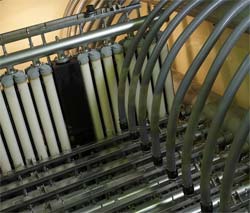Siemens to provide a membrane filtration system for Highland Park, Illinois’ Water Treatment Plant upgrade

A Memcor CS membrane filtration system
The system, which will treat water from Lake Michigan, will replace an aging conventional filtration plant at the facility, and increase the plant’s rated capacity from 21 MGD (79 MLD) to 30 MGD (113 MLD). When started up, this will be the 12th Memcor membrane system operating on Lake Michigan. CDM is the consulting engineer on the project, which is scheduled for completion in the winter of 2012.
The plant, located in this North Shore Chicago suburb, serves approximately 60,000 people. Built in 1930 and expanded twice, the facility’s treatment capacity is now at its limits. Retrofitting the plant will involve removing the roof from one of four settling basins, and installing a 30-MGD (113- MLD) membrane system in what will become the membrane process room.
During construction, the existing water treatment plant will continue to operate in order to provide Highland Park’s customers with all the water they need. When this retrofit project is completed, the City will have increased its rated treatment capacity by over 40% in the space once occupied by only 25% of its coagulation/flocculation/settling process.
The City chose the Memcor submerged membrane system following a 12-month pilot study and competitive procurement process, whereby Siemens’ Memcor CS technology was shown to provide the best value.
The Memcor CS submerged membrane filtration system is popular for retrofit of aging drinking water plants as it offers great design flexibility, a lower life-cycle cost and compact footprint. It also provides a greater than 4-log removal of Cryptosporidium, Giardia and bacteria, over 1.5-log virus rejection and a silt density index of less than 2.0, regardless of changing feed water conditions.
Memcor is a trademark of Siemens and its affiliates in some countries.
The Siemens Industry Sector (Erlangen, Germany) is the world's leading supplier of production, transportation, building and lighting technologies. With integrated automation technologies as well as comprehensive industry-specific solutions, Siemens increases the productivity, efficiency and flexibility of its customers in the fields of industry and infrastructure. The Sector consists of six Divisions: Building Technologies, Drive Technologies, Industry Automation, Industry Solutions, Mobility and Osram. With around 222,000 employees worldwide Siemens Industry posted in fiscal year 2008 a profit of EUR3.86 billion with revenues totaling EUR38 billion.
With the business activities of Siemens VAI Metal Technologies, (Linz, Austria), Siemens Water Technologies (Warrendale, Pa., U.S.A.), and Industry Technologies, (Erlangen, Germany), the Siemens Industry Solutions Division (Erlangen, Germany) is one of the world's leading solution and service providers for industrial and infrastructure facilities. Using its own products, systems and process technologies, Industry Solutions develops and builds plants for end customers, commissions them and provides support during their entire life cycle. With around 31,000 employees worldwide Siemens Industry Solutions achieved an order intake of EUR 8.415 billon in fiscal year 2008.
Media Contact
All latest news from the category: Corporate News
Newest articles

Magnetic Memory Unlocked with Energy-Efficient MRAM
Researchers from Osaka University introduced an innovative technology to lower power consumption for modern memory devices. Stepping up the Memory Game: Overcoming the Limitations of Traditional RAM Osaka, Japan –…

Next-Level System Security: Smarter Access Control for Organizations
Cutting-Edge Framework for Enhancing System Security Researchers at the University of Electro-Communications have developed a groundbreaking framework for improving system security by analyzing business process logs. This framework focuses on…

How Microbial Life Shapes Lime Formation in the Deep Ocean
Microorganisms are everywhere and have been influencing the Earth’s environment for over 3.5 billion years. Researchers from Germany, Austria and Taiwan have now deciphered the role they play in the…



